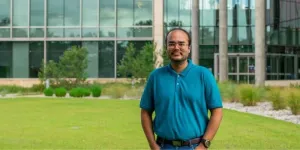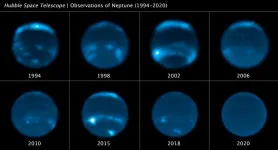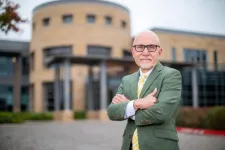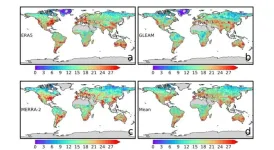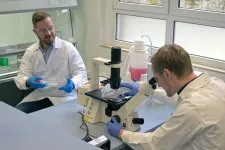(Press-News.org) Quantifying Counterfactual Military History probes whether historic battles and military interventions could have turned out quite differently
Oxford, U.K., 30 August 2023 – Statistical methods can evaluate whether pivotal military events, like the Battle of Jutland, American involvement in the Vietnam war or the nuclear arms race, could’ve turned out otherwise, according to a new book.
Military historical narratives and statistical modelling bring fresh perspectives to the fore in a ground-breaking text, Quantifying Counterfactual Military History, by Brennen Fagan, Ian Horwood, Niall MacKay, Christopher Price and Jamie Wood, a team of historians and mathematicians.
The authors explain: “In writing history, it must always be remembered that a historical fact is simply one of numberless possibilities until the historical actor moves or an event occurs, at which point it becomes real. To understand the one-time possibility that became evidence we must also understand the possibilities that remained unrealized.”
Re-examining the battlefield
Midway through the First World War, Britain and Germany were locked in a technologically driven arms race which culminated in the Battle of Jutland in 1916. By that time, both nations had built over 50 dreadnoughts – speedy, heavily-armored, turbine-powered ‘all-big-gun' warships.
In the context of a battle that Britain couldn’t afford to lose, Winston Churchill was quoted as saying that the British commander John Jellicoe was “the only man on either side who could lose the war in an afternoon.”
Both nations, at various points in time, have claimed victory in the Battle of Jutland, and there is no consensus on who “won”. Using mathematical modeling, Quantifying Counterfactual Military History probes whether the Germans could have achieved a decisive victory.
The five scholars note: “This reconstructive battling enables us to put some level of statistical insight into multiple realizations of a key phase of Jutland. The model is crude and laden with assumptions – as are all wargames – but, unlike in a wargame, our goal is simply to understand what is plausible and what is not.”
Understanding nuclear deterrence
Counterfactual reasoning is positioned centrally when it comes to the fraught history of nuclear deterrence. By the 1980s, the nuclear arms race between the US and the Soviet Union had already spanned three decades and 1983 would bring a crisis less well-known than the Cuban missile crisis of 1962.
The authors draw attention to the peak of intensity in November 1983 during the so-called ‘Second Cold War’. A NATO ‘command post’ exercise in Western Europe – known as Able Archer – was created to test communications in the event of nuclear war.
The Soviets, however – likely the result of faulty intelligence gathering – believed that an attack was imminent with the NATO exercise interpreted as the first phase. Quantifying Counterfactual Military History highlights the example as one where each side placed themselves in dangerous counterfactual mindsets.
“Mutual misapprehension in 1983 continued a long tradition of misunderstanding which had always created catastrophic potential for war, now based consciously and unconsciously on game theory and its erroneous assumption that rational actors were guided by accurate information,” the authors explain. “In this way they stumbled towards a war that neither had willed.”
Embrace the alternative
Quantifying Counterfactual Military History uses case studies of Jutland, Able Archer, the Battle of Britain and the Vietnam War to appraise long-established narratives around military events and examine the probabilities of the events that took place alongside the potential for alternative outcomes.
The book’s authors, however, take a restrained approach to counterfactual theory, one that acknowledges and considers why some events – including the actions of individuals or the rise of institutions – are more important than others and can be considered “critical junctures”. They understand this as very different from the arbitrary, loosely substantiated suppositions made by “exuberant” counterfactuals.
They say: “We can never be certain of the existence of critical junctures, or of the grounds of their criticality, but ‘restrained’ counterfactuals, if done with multiple perspectives and sufficient thoroughness, can surely make a distinctive contribution to the literature.”
The book is underpinned by an inter-disciplinary method which combines historical narrative and statistical data and analysis, offering both quantitative and qualitative rigor.
They explain: “This study has taken us in directions which are not common in academic collaboration, but which we hope demonstrate that collaborative research exploring what had been dead ground between the sciences and the humanities is long overdue.”
Rather than attempt to merely reinvent the past, Quantifying Counterfactual Military History calls attention to the dynamism inherent in historical practice and offers another tool for understanding historical actors, the decisions they made and the futures they shaped.
END
Statistics can help us figure out how historic battles could have turned out differently, according to experts
A genre-bending appraisal of military history through historical and mathematical study is available next month
2023-08-30
ELSE PRESS RELEASES FROM THIS DATE:
Using neuroscience to stop phantom braking
2023-08-29
EAST LANSING, Mich. — Recently, when customers began complaining that their vehicles with driver-assistance technologies were “phantom braking” or slamming on the brakes without any visible obstacles present, researchers at Michigan State University wanted to learn more about this phenomenon — why it happens and how to stop it.
“Frequent phantom braking incidents can erode confidence in autonomous driving technologies,” said Qiben Yan, an assistant professor in the College of Engineering. “If riders perceive the technology as unpredictable or unreliable, they’ll be less likely to embrace it.”
Autonomous vehicles have a vision system, ...
Sensitive parenting and preschool attendance may promote academic resilience in late preterm infants
2023-08-29
Late preterm infants, or infants born between 34 and 36-6/7 weeks gestation, are the majority of infants born preterm, and are at greater risk for academic delays compared to full term infants.
Certain factors, including a low level of maternal education, prenatal tobacco use, twins/multiple gestation and male sex increased the risk for deficits in math and reading by kindergarten for late preterm infants, a new study finds.
However, sensitive parenting and preschool enrollment are two possible ways to counter the risk of being born late preterm, and to promote academic resilience.
“Our findings highlight an opportunity for pediatric providers to offer prevention strategies ...
New imaging technique could provide clearer images for oncologists
2023-08-29
A multidisciplinary team lead by University of Texas at Arlington mathematics Assistant Professor Souvik Roy is on a mission to improve medical imaging using a new technique called quantitative photoacoustic tomography (QPAT).A multidisciplinary team lead by University of Texas at Arlington mathematics Assistant Professor Souvik Roy is on a mission to improve medical imaging using a new technique called quantitative photoacoustic tomography (QPAT).
QPAT is an imaging modality that combines ultrasound, which is an imaging technique that uses sound waves to image features inside ...
Neptune's disappearing clouds linked to the solar cycle
2023-08-29
Astronomers have uncovered a link between Neptune's shifting cloud abundance and the 11-year solar cycle, in which the waxing and waning of the Sun's entangled magnetic fields drives solar activity.
This discovery is based on three decades of Neptune observations captured by NASA's Hubble Space Telescope and the W. M. Keck Observatory in Hawaii, as well as data from the Lick Observatory in California.
The link between Neptune and solar activity is surprising to planetary scientists because Neptune is our solar system's farthest major planet and receives sunlight with about 0.1% ...
Liver-targeting drug reverses obesity, lowers cholesterol in mice
2023-08-29
A University of Massachusetts Amherst biomedical engineer has used a nanogel-based carrier designed in his lab to deliver a drug exclusively to the liver of obese mice, effectively reversing their diet-induced disease.
“The treated mice completely lost their gained weight, and we did not see any untoward side effects,” says S. Thai Thayumanavan, distinguished professor of chemistry and biomedical engineering. “Considering 100 million Americans have obesity and related cardiometabolic disorders, we became pretty excited about this work.”
Efforts ...
MIND Institute director calls for new approach to equity in autism, fragile X research
2023-08-29
UC Davis MIND Institute Director Leonard Abbeduto is calling for a major shift in the way research into autism and other neurodevelopmental disabilities is conducted. He co-authored a paper titled “Toward Equity in Research on Intellectual and Developmental Disabilities” that was the basis for a special issue of the American Journal on Intellectual and Developmental Disabilities. The issue was published today.
Abbeduto, a distinguished professor in the Department of Psychiatry and Behavioral Sciences, argues that researchers ...
Rapid shifts from drought to downpour occurring more often
2023-08-29
New research shows that wild swings from severe drought to heavy rains are becoming more common with climate change in many parts of the world and that feedback loops from the land itself are likely contributing to the trend.
The research looked at four decades of meteorological and hydrological data on a global level and found seven regional hotspots around the world where the trend was getting worse: eastern North America, Europe, East Asia, Southeast Asia, southern Australia, southern Africa, and southern South America.
“We are especially concerned with the sudden shift from drought to flood,” said coauthor Zong-Liang Yang, a professor at The University of Texas at Austin Jackson ...
Hemp helps to heal
2023-08-29
A few days ago, the federal government took the controversial decision to make the acquisition and possession of small amounts of cannabis exempt from punishment. Provided the German parliament approves the draft bill, the “Cannabis Act” will come into force next year. While some consider this move to be long overdue, others continue to warn strongly against the health risks of cannabis use.
The Jena researchers and their colleagues are now taking a different look at cannabis – at the traditional medicinal ...
Department of Energy announces $24 million for research on quantum networks
2023-08-29
WASHINGTON, D.C. - Today, the U.S. Department of Energy (DOE) announced $24 million in funding for three collaborative projects in quantum network research.
Scientific research infrastructure linked with quantum networks is needed to realize distributed quantum computers. These quantum computers could simulate complex scientific processes inaccessible to computational platforms of today, integrate quantum sensors that promise measurements of unprecedented precision, and address previously inaccessible scientific questions of importance.
“Advances in quantum networking are enabling effective interconnections ...
A new fly model developed to find treatments for UBA5 deficiency, a rare epileptic brain disorder
2023-08-29
Developmental and epileptic encephalopathy (DEE) refers to a group of neurodevelopmental conditions characterized by developmental delay, cognitive impairment, and seizures in children. In 2016, the first case linking variants in both the copies of UBA5 gene to DEE44 was reported. Since then, twelve distinct missense variants in the UBA5 gene have been identified in 25 patients. A recent study by Dr. Hugo J. Bellen and his team at the Jan and Dan Duncan Neurological Research Institute (Duncan NRI) at Texas Children’s Hospital and Baylor College of ...
LAST 30 PRESS RELEASES:
Roadmap for Europe’s biodiversity monitoring system
Novel camel antimicrobial peptides show promise against drug-resistant bacteria
Scientists discover why we know when to stop scratching an itch
A hidden reason inner ear cells die – and what it means for preventing hearing loss
Researchers discover how tuberculosis bacteria use a “stealth” mechanism to evade the immune system
New microscopy technique lets scientists see cells in unprecedented detail and color
Sometimes less is more: Scientists rethink how to pack medicine into tiny delivery capsules
Scientists build low-cost microscope to study living cells in zero gravity
The Biophysical Journal names Denis V. Titov the 2025 Paper of the Year-Early Career Investigator awardee
Scientists show how your body senses cold—and why menthol feels cool
Scientists deliver new molecule for getting DNA into cells
Study reveals insights about brain regions linked to OCD, informing potential treatments
Does ocean saltiness influence El Niño?
2026 Young Investigators: ONR celebrates new talent tackling warfighter challenges
Genetics help explain who gets the ‘telltale tingle’ from music, art and literature
Many Americans misunderstand medical aid in dying laws
Researchers publish landmark infectious disease study in ‘Science’
New NSF award supports innovative role-playing game approach to strengthening research security in academia
Kumar named to ACMA Emerging Leaders Program for 2026
AI language models could transform aquatic environmental risk assessment
New isotope tools reveal hidden pathways reshaping the global nitrogen cycle
Study reveals how antibiotic structure controls removal from water using biochar
Why chronic pain lasts longer in women: Immune cells offer clues
Toxic exposure creates epigenetic disease risk over 20 generations
More time spent on social media linked to steroid use intentions among boys and men
New study suggests a “kick it while it’s down” approach to cancer treatment could improve cure rates
Milken Institute, Ann Theodore Foundation launch new grant to support clinical trial for potential sarcoidosis treatment
New strategies boost effectiveness of CAR-NK therapy against cancer
Study: Adolescent cannabis use linked to doubling risk of psychotic and bipolar disorders
Invisible harms: drug-related deaths spike after hurricanes and tropical storms
[Press-News.org] Statistics can help us figure out how historic battles could have turned out differently, according to expertsA genre-bending appraisal of military history through historical and mathematical study is available next month

